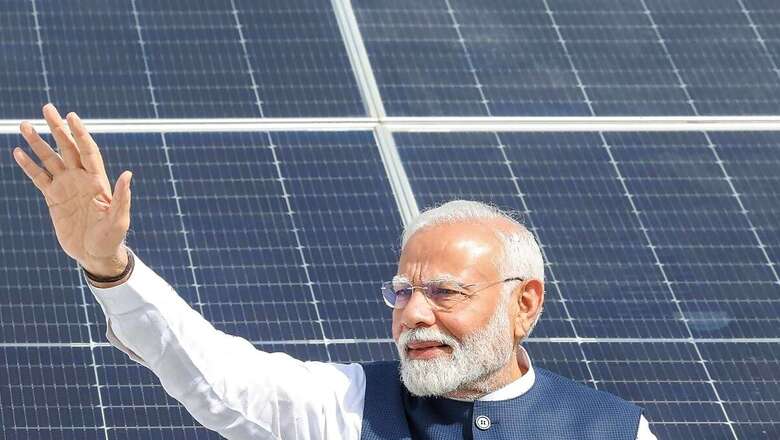
views
A meeting with Bangladesh’s Muhammad Yunus is not on the cards, even though Yunus had expressed a desire to meet with Modi. Some may argue that a meeting would provide an occasion for a frank exchange of views on our concerns about the developing situation in Bangladesh and the anti-Indian orientation that it is taking. On the other hand, it is also apparent that Yunus is a figurehead and not in control of the internal forces at play, besides the fact that his interim position is not constitutionally legitimate. In any case, our High Commissioner in Bangladesh is engaging the key members of the interim government.
Donald Trump said at one of his rallies that he would be meeting Modi. Unless Trump is in New York it is not clear how this meeting can be arranged. Since the electoral race is very close and Trump could well win, it might be politic not to appear to snub him by declining a meeting, which he seems to want. On the other hand, politics in the US has got so highly polarised that the Kamala Harris camp may not view Modi’s meeting with Trump kindly, especially because of their past Houston bonhomie, and impute it as interference in the election process. Since Modi will not be meeting Harris, it would obviously be best to avoid meeting Trump. The Foreign Secretary in his press briefing has been evasive on the subject.
The Quad summit is being hosted by Joe Biden in his native Delaware. He is still the president but he is a diminished figure because of the manner in which his bid for a second term was ingloriously terminated by Democratic Party leaders, apart from his cognitive difficulties. The presidential election is also only a few weeks away. If he were still in the race, the Quad summit would have had a different meaning. Prime Minister Fumio Kishida of Japan, another participant, is also on his way out.
In any case, whether Trump wins or Harris wins, the China challenge, which both parties recognise, means that the Quad will remain relevant and important.
The Biden presidency has, on the whole, been positive for India. During this time, Modi made a state visit to the US and addressed the US Congress for the second time. Differences between the US and India on our ties with Russia, including in the area of defence, our purchase of discounted Russian oil, our unwillingness to take sides in the Russia-Ukraine conflict and abstaining on resolutions in the UN targeting Russia, were contained, though simmering resentments on the US side remain.
Many agreements in the area of defence-related cooperation, including on the easing of export controls, were signed. Some significant projects such as the supply of GE 404 engines for our Tejas Mk1 and Mk1A aircraft and the co-production of GE 414 engines for Tejas Mk2 and initial batches of the AMCA, with substantial transfer of technology have been concluded. The supply of GE 404 engines has, however, encountered delays because of supply chain issues on the US side, leading to some speculation about the reasons, but it appears that the US had outsourced manufacturing of some parts of the engine to other countries and that is where bottlenecks have arisen.
India-US cooperation in the area of critical and emerging technologies as part of the ICET agreement breaks vital ground for cooperation in areas such as AI, quantum computing, robotics, biotechnology, critical materials, 5G and 6G, human spaceflight semiconductors etc. That the ICET is headed by the National Security Advisers on both sides testifies to the serious commitment of both countries to this initiative. Progress is bound to be slow, and is slow, because of the very complex layers of US controls on technology cooperation, besides the fact that the ICET project involves government, research bodies, academia and the private sector. Added to which are US concerns about leakages of such technologies to Russia from India. The INDUS X is an India-US Defence Acceleration Eco-System involving India and US startups was also launched during the Biden presidency. US NSA Jake Sullivan has been a motivating force in India-US ties.
It is under the Biden presidency that the Quad was raised to the summit level. In that light, India’s decision to cede its turn to hold the summit to Biden, as a farewell gesture to him, is the right one. India is committed to the Quad, which we now describe as a global good, notwithstanding the opposition of both China and Russia as they see it as a throwback to bloc politics. No doubt, China is a glue that binds the Quad together, as all four countries have concerns about Chinese geopolitical assertiveness and expansionism. At the same time, all four have major trade ties with China, which prevents a robust confrontation with China, as the cost to all in varying degrees will be high.
The US does not want a military confrontation with China, which gives China scope for putting steady pressure on Taiwan and the Philippines, and, in general, asserting itself in the South and East China Seas. Australia has reached out to China after a period of tensions. Japan is flexing its military muscles a bit, but the US security umbrella is vital for it. Under Kishida, it has moved even more firmly into the US orbit to the extent of supporting Ukraine and breaking off with Russia.
The Quad is tied to the Indo-Pacific concept. Its weakness as a firm strategic platform has been exposed by US policy in Bangladesh that has facilitated Sheikh Hasina’s removal of power and inflicted a strategic blow to India in a very vulnerable part of its territory in the northeast, potentially to China’s advantage. It has damaged India’s security in the Bay of Bengal.
It is interesting that Kurt Campbell, Deputy Secretary of State in the State Department, who was earlier responsible for the Indo-Pacific affairs in the White House, and a positive force on Indo-Pacific issues, has stated in a Congressional testimony that India and the US will hold a session on the Indian Ocean to discuss concerns. This suggests that the focus earlier was on the Pacific and not on the Indian Ocean where India’s priorities lie. This is not surprising because the US has military bases, force deployments and security alliances in the region, with the Taiwan issue, and now that of the Philippines, presenting a direct challenge to the US in the region. In the Indian Ocean, the direct Chinese military and maritime challenge is to India.
Under Biden, relations have been marred by US activism on issues of human rights, the treatment of minorities and the state of democracy in India. Secretary of State Blinken has twice singled out India on human rights issues while presenting the State Department’s annual report on human rights across the world, which is unprecedented. In the context of the Modi-Biden bilateral meeting in Delaware, the State Department spokesperson said that the issue of human rights has been raised by Biden with Modi in the past and he assumes it will be raised again as appropriate. This is a very unfortunate aspect of the US’ lack of sensitivity and consideration towards India whose democracy is in better shape than that of the US with two assassination attempts against Trump and other vagaries of the US voting system.
With the US, given its system, it will not be smooth sailing when it comes to forging increasingly close ties. One should build on the positives, and push back on the negatives without losing sight of the bigger picture. India had good ties with the Trump administration and good ties also with the Biden administration. This suggests that both sides value the relationship, even if in different measures. For us, the challenge is to continue capitalising on shared interests in an increasingly complex international environment.
Kanwal Sibal is a former Indian Foreign Secretary. He was India’s Ambassador to Turkey, Egypt, France and Russia. Views expressed in the above piece are personal and solely that of the author. They do not necessarily reflect News18’s views.


















Comments
0 comment